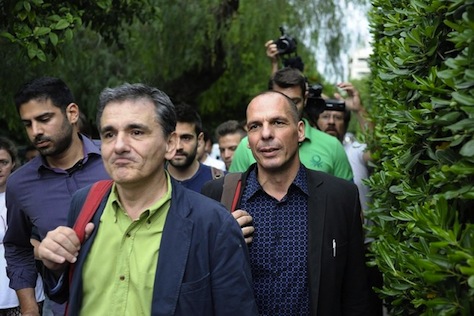The world woke up to the news Monday morning that outspoken Greek finance minister Yanis Varoufakis had, at long lost, been dismissed by his prime minister, Alexis Tsipras.![]()
Varoufakis (pictured above, right, behind Greece’s new finance minister, Euclid Tsakalotos) had become, to say the least, a brake on negotiations with the Eurogroup, even though his widespread popularity and strident anti-austerity boosted Tsipras’s government to a stunning victory in Sunday’s debt negotiations referendum, whereby 61.31% of voters rejected a prior plan offered by Greece’s European creditors.
European officials struggled to reach consensus with Varoufakis, who just last week, in the middle of the rushed referendum campaign, referred to his European ministerial colleagues as ‘terrorists.’ Tsakalotos, an Oxford-trained economist, is expected to take a more mild-mannered approach, and he already supplanted Varoufakis as Greece’s chief negotiator back in April. That was, however, only to the extent anyone could supplant the motorbike-riding, free-wheeling Varoufakis, who gave his final press conference as finance minister Sunday night in a t-shirt.
* * * * *
RELATED: If Grexit comes,
Greece will have wasted five years in depression
* * * * *
Varoufakis’s resignation, along with a pledge of national unity across Greece’s mainstream domestic political spectrum, breathed new life into hopes for last-minute talks for a third bailout, allowing the country to reopen its illiquid and perhaps insolvent banks, lift (at least partially) capital controls that have limited daily cash withdrawals to €60, restore liquidity to ATMs that have run out of cash altogether, address Greece’s €1.6 billion default on June 30 to the International Monetary Fund and meet a July 20 deadline to make a €3.5 billion payment to the European Central Bank.
For all the celebration that followed the resounding ‘no’ vote in Sunday’s referendum, the coming Sunday could bring financial austerity far more severe than Greece has known in the past five years, marked by a nearly 30% drop in GDP growth and a 26% unemployment rate. Failure to reach a deal could result in a shortage of cash, food, medicine and so many other necessities to the extent that European leaders are whispering that Greece could require humanitarian aid.
Notwithstanding the dire consequences, a deal is not necessarily likely — or even possible. If they’re lucky, the European Union has five days to prevent Grexit. Here are four reasons why it will be so difficult in the hours ahead. Continue reading Three ways Europe and Greece could blow their last chance at a debt deal



